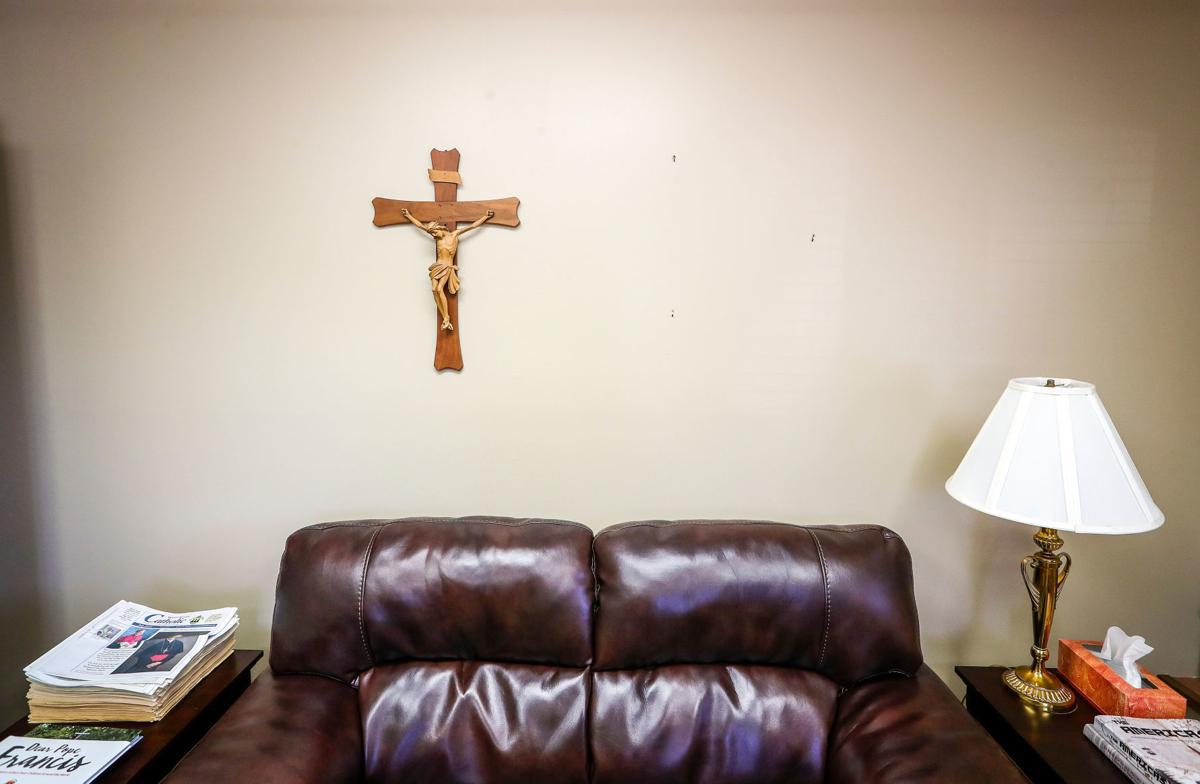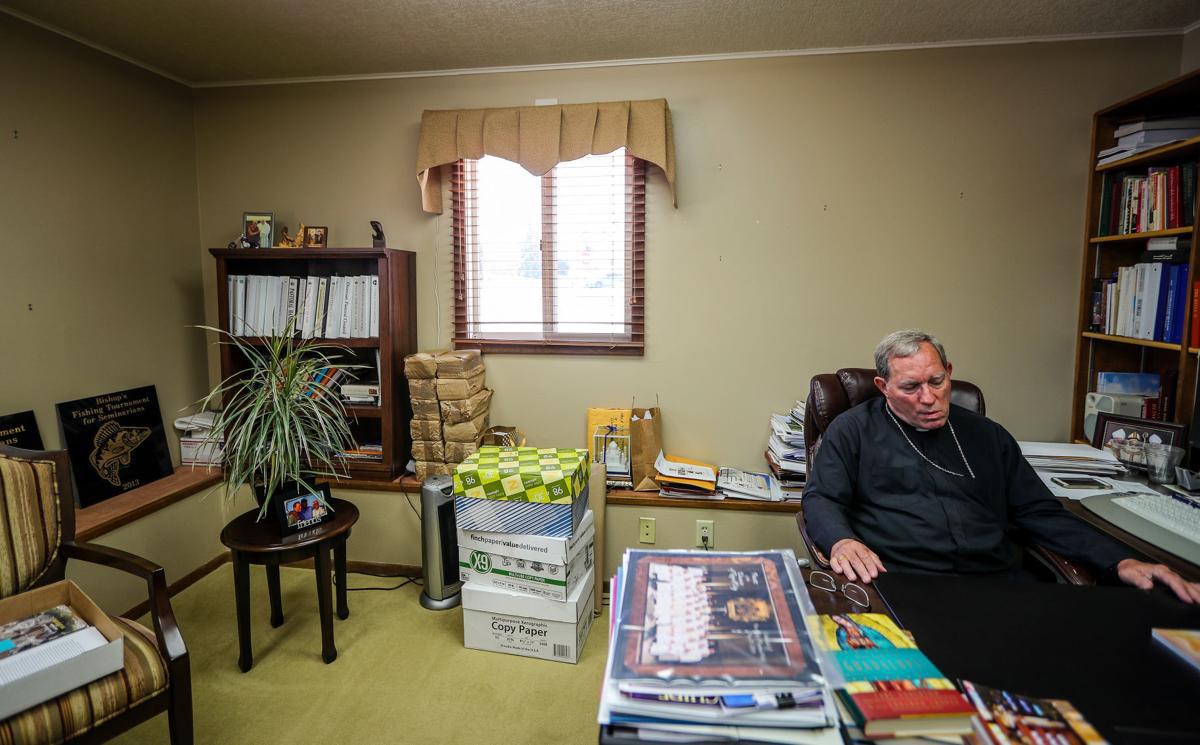|
Outgoing bishop will remember coworkers, people he served
By Arielle Zionts
Bishop Robert Gruss sat in his office Thursday afternoon, focusing on his computer and surrounded by stacks of books, a few decorations and packed boxes. The 64-year-old bishop was still hard at work responding to emails and hosting back-to-back meetings before leaving Saturday after eight years with the Rapid City Diocese, which oversees churches and Catholic life across western South Dakota. Departing Rapid City to serve as the bishop of the Diocese of Saginaw in Michigan is a "bittersweet" moment, Gruss said. "Leaving a place that you come to know and love, it's hard leaving," he said. "I've made a lot of great friendships and good relationships. I love the people here. I love the land. I've really enjoyed being with and working with the Native American population. "There's kind of a holy sorrow to it in the sense that it's what the lord has called me to, and I desire to do the will of God. And I really do feel that I've been called there, missioned there, to serve the people of Saginaw. So there's deep gratitude in my heart for these eight years that the lord has given me here and there's anticipation, I think there's some excitement for me moving to the Diocese of Saginaw and ministering to the people there." Gruss was born in Arkansas and grew up in Texas, Oklahoma, Missouri and Wisconsin, according to his biography on the diocese website. He worked as a pilot and flight instructor for nine years before he began studying religion and preparing for the priesthood. He was ordained in 1994 and served various roles in the United States and Vatican City before becoming Bishop of Rapid City in 2011. He said he felt like a "deer in the headlights" when he first arrived in Rapid City since it was his first time serving as a bishop. "I think my fondest memories are going to be the people I served" and the "extremely supportive" people I worked with, Gruss said. "We've accomplished a lot of beautiful things." He said he's proud of creating a diocesan priority plan, opening the Veritatis Splendor Institute, and starting perpetual adoration at the Cathedral of Our Lady of Perpetual Help in Rapid City. The institute certifies catechists — lay people who are knowledgeable about Catholicism and teach others about the faith — and educates other lay people who want to learn more about their religion, Gruss said. Perpetual adoration involves displaying the consecrated host (also known as sacramental or communion bread) 24/7, which means people can be in private prayer with Jesus at any time, Gruss said. He compared the power of praying in front of the host versus praying elsewhere to the difference between meeting a friend in person versus calling them on the phone. "I could sit here and pray to Jesus, right. It's kind of like being on the phone. I don't see him," Gruss said. "But if I go over there (to the cathedral), and there's adoration, I see him: his body, blood, soul and divinity, his real presence. I see him because he's there. I'm face to face with him." Gruss called it "very exciting" to work on the canonization of Nicholas Black Elk, an Oglala Lakota holy man who led prayer and the Eucharist on the Pine Ridge Reservation and brought more than 400 Native Americans to Catholicism. "Not many bishops get that opportunity" to help make someone a saint, he said. Black Elk becoming a saint would be meaningful not just to the Lakota people but Catholics worldwide, the bishop said. Gruss also spearheaded the Living the Mission campaign to raise $12 million for local parishes, a priest pension plan, the Rapid City Catholic school system, the Native American Ministry Endowment, and a new downtown pastoral center, according to the diocese's website. The pastoral center will provide offices for all diocese staff, who are currently spread between three buildings in two locations. "It just gives us more of a living presence right downtown. We're closer to the people that we want to serve," Gruss said about the new center, which will be located at the Black Hills Federal Credit Union building on Main Street. Gruss said he decided to release a detailed list of priests credibly accused of sexual abuse because "there should be openness and transparency and accountability" in the church. "Our Catholic faithful are calling, they're pleading, they're begging, they're screaming for openness and transparency," he said, adding that the list may encourage victims to come forward. "It's all about healing victims of sexual abuse by clergy. That's my goal," he said. Gruss had to deal with a new sexual abuse case when Father John Praveen — a priest from India who joined the diocese for a 10-year assignment — was sentenced in March to six years in prison after admitting to sexually abusing a 13-year-old girl in the cathedral. The diocese cooperated with the investigation, according to Gruss and statements from law enforcement. But "I think we certainly could have reached out to the victim in a more intentional way, in a better way," the bishop said, calling the abuse "horrific." "We could have done a lot better." Gruss said he has "no idea" who will replace him as bishop. "I don't name my replacement," he said with a laugh. It's also a "great mystery" as to when the new bishop will be announced. Gruss said he came to Rapid City a year after Bishop Blase Cupich left and he's arriving in Saginaw nine months after the previous bishop died. In the meantime, leaders of the Rapid City Diocese will soon elect a priest to serve as administrator until the new bishop arrives. Gruss said his goals in Saginaw will be similar to his work in Rapid City: preaching the gospel, helping people strengthen their faith and addressing community problems. "I can't put forth a vision until I come to understand the needs of the people," Gruss said. He plans to do that by "taking the time to listen to the people and listen to the priests and to the staff and to the Catholic population at large and find out what's going on, what's not so good, what they would like to see."
|
.
Any original material on these pages is copyright © BishopAccountability.org 2004. Reproduce freely with attribution.



